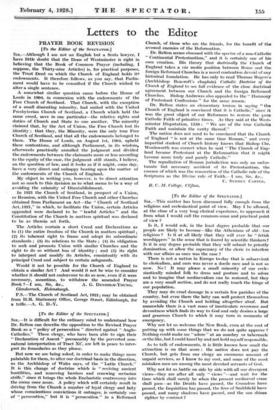Letters to the Editor
PRAYER BOOK REVISION
[To the Editor of the SPECTATOR.]
Sia,—Although I am not an English but a Scots lawyer, I have little doubt that the Dean of Westminster is right in believing that • the Book of Common Prayer (including, I suppose, the Thirty-nine Articles) is, for practical purposes, the Trust Deed on which the Church of England holds its endowments. It therefore follows, as you say, that Parlia- ment would have to be consulted if the Church wished to alter a single sentence,
A somewhat similar question came before the House of Lords in -1904, in connexion with the endowments of the Free Church of Scotland. That Church, with the exception of a small dissenting minority, had united with the United Presbyterian Church of Scotland, a Church which held the same _creed, save in one particular—the relative rights and duties, of Church and State to one another. The minority claimed that, by the Act of Union, the Free Church lost its identity ; that they, the Minority, were the only true Free Church of Scotland, and that all the endowments belonged to them. The House of Lords, on August 1st, 1904, upheld these contentions, and although Parliament, in its wisdom, afterwards. practically annulled the judgment and divided the endowments between the claimants more or less according to the equity of the case, the judgment still stands, I believe, on the question of law, and it looks as if it might, some day, have a very, direct and unhappy bearing upon the matter of the . endowments of the Church of England.
.My object, in writing you, however, is to direct attention not so much to this decision as to what seems to be a way of avoiding the calamity of Disestablishment.
In 1921 the Church of Scotland, in prospect of a Union, or Reunion, with the United -Free Church and other Churches obtained from Parliament an Act—the " Church of Scotland Act, 1921," in which, to facilitate the Union, certain Articles appended were declared to be " lawful Articles " and the Constitution of the Church in matters spiritual was declared to be as therein set forth.
The Articles contain a short Creed and Declarations as to (1) the entire freedom of the Church in matters spiritual ; (2) its inherent right to frame and adopt its subordinate standards ; (3) its relations to the State ; (4) its obligation to seek and promote Union with similar Churches and the right to do so without loss of identity ; and (5) its right to interpret and modify its Articles, consistently with its principal Creed and subject to certain safeguards.
Would it not be possible for the Church of England to obtain a similar Act ? And would it not be wise to consider whether it should not endeavour to do so now, even if it were necessary, meantime, to withdraw the amended Prayer
Book ?—I am, Sir, &c., A. G. DENIIOLM-YOUNG. Glendarroch, Helensburgh.
P.S.—The Church of Scotland Act, 1921; may be obtained from H.M. Stationery Office, George Street, Edinburgh, for a trifle.—A. G. D.-Y.






































 Previous page
Previous page